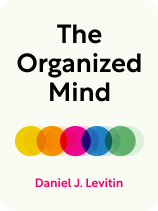

This article is an excerpt from the Shortform book guide to "The Organized Mind" by Daniel J. Levitin. Shortform has the world's best summaries and analyses of books you should be reading.
Like this article? Sign up for a free trial here.
How reliable are citizen journalists? What kind of person can you go to for expert advice on the validity of an information source?
Neuroscientist Daniel J. Levitin believes that you can do your overwhelmed brain a favor by not trying to hold everything in your head. That means that you must rely on external sources of information. But, you want to do all you can to make sure the information is valid.
Read more for Levitin’s advice on how to evaluate information and its sources.
How to Evaluate Information & Sources
Levitin contends that storing information in your head is problematic because of the flawed ways in which our attention and memory work. He suggests that the answer lies in conserving your mental resources so you have more brain power and energy to deal with the decisions that matter. One of the ways you can do this is via externalization—storing information outside your brain by writing it down.
Although Levitin focuses primarily on the benefits of externalizing information, he warns that externalized information can also have pitfalls. That’s why he offers some practical advice on how to evaluate information and sources.
Levitin considers the internet to be a mostly useful external depository of information. However, he warns that the existence of a source doesn’t guarantee its accuracy. Therefore, to ensure that externalizing information helps rather than harms you, develop the ability to evaluate that information well.
First, Levitin suggests that you learn to critically evaluate your sources. Pay attention to the legitimacy of the source and whether they might have an ulterior motive; for example, a water filtration company’s article about the dangers of unfiltered water may not be totally reliable. And remember that even legitimate sources—like major newspapers—still tend to have some bias; for example, a journalist may choose not to report on a story that would damage the newspaper’s owner. Be especially careful during breaking news events: During such events, we often rely on the word of citizen journalists, who usually aren’t as careful about verifying information before sharing it.
(Shortform note: If you’re struggling to find good sources about a particular topic on the internet, consider visiting your local library and speaking to the reference librarian. A good reference librarian can point you to both internet and non-internet sources you may not otherwise have access to, whether that’s a book in the library catalog or a paid academic database. She is professionally trained to evaluate a source’s legitimacy. If she’s familiar with a particular source, she may even be able to tell you what biases this source may have. And while you should be wary of the accuracy of citizen journalists, don’t totally discount them: If you’re interested in hyperlocal breaking news, they may be the only people covering it online.)
Second, Levitin suggests that you learn to critically evaluate data. In particular, Levitin warns against confusing causation and correlation. When A and B happen together, we tend to believe that A caused B, but they may simply be related by chance. Alternatively, there may be some other factor C that caused both A and B (or is correlated with A and caused B). For example, if trees live longer in neighborhoods with worse roads, you may suspect that something about damaging paved roads improves tree health. But in reality, it may be that these neighborhoods simply can’t afford to do any maintenance—so they don’t fix their roads and don’t alter the trees.
| Understanding the Relationship Between Two Variables How can you tell whether two variables are merely correlated or may have a causal relationship? This usually requires further research. In Naked Statistics, Charles Wheelan explains that statisticians often decide their next step based on a value called the correlation coefficient, which communicates the strength of the relationship between two variables: A coefficient of one means a “perfect correlation” while a coefficient of zero means “no meaningful relationship.” For example, if researchers investigating lead poisoning find a correlation coefficient of 0.8 between the amount of city water people drank and lead levels in their blood, these findings wouldn’t prove that city water is causing lead poisoning—but it would warrant investigating the city’s water quality. |

———End of Preview———
Like what you just read? Read the rest of the world's best book summary and analysis of Daniel J. Levitin's "The Organized Mind" at Shortform.
Here's what you'll find in our full The Organized Mind summary:
- The key to living less stressfully in the modern world
- Why our current approach to dealing with stress doesn’t work
- Strategies for sorting and externalizing your thoughts, things, and relationships






